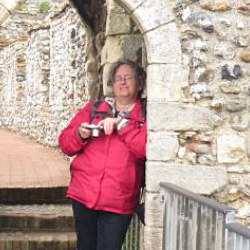
'My job means it’s too difficult to join CIfA’ - or does it?
I often hear people mumbling ‘it’s too complicated’ or ‘it doesn’t apply to me’ when they think about joining or upgrading their CIfA professional accreditation. I’ve even had similar thoughts myself: ‘I’m in a job which proves difficult to demonstrate my skills at MCIfA’.
Let’s be truthful: it’s difficult to fill in the statement of competence, especially at a higher grade, in a way that fully demonstrates your skills. The application takes time and effort to complete, and if you are already accredited, why bother going for a higher grade?
In all honesty, it shouldn’t be easy: you want to join a Chartered Institute which may lead to the opportunity in the future to become a Chartered Archaeologist and achieving accreditation is good for you to reflect your level of competence, for your employer to demonstrate a professional workforce and for CIfA – you are part of the Institute and your opinions matter.
I work in archaeological archives and (even though I’m a member of the Validation committee) found it hard to think what documentary evidence to use to demonstrate my skills. I was already an Associate (ACIfA) and had often thought about upgrading to Member (MCIfA), but felt the main competence matrix did not fully explain what I needed, and that demonstrating my competence to the Validation committee at this higher level seemed very difficult.
To help with this, CIfA Special Interest Groups have developed a series of specialist competence matrices to support the main matrix – and they are designed to help both applicants and the committee.
These cover archives, buildings, fieldwork, finds, forensics, geophysics, graphics, information management, international heritage, museum archaeology, osteology (British Association for Biological Anthropology and Osteoarchaeology – BABAO) and project management. A lot of effort has gone into these – I know because I was involved in writing and structuring the archives matrix.
Recently I decided to bite the bullet and upgrade my membership using the archives matrix. Here’s some advice based on my own experience:
- Make it clear in your application which matrix you’ve used. The committee can use this too to help assess your application.
- Send a copy of the specialist matrix to your referee, especially if your role is one in which it is difficult to document your skills and abilities. In this case, make sure you choose your referees carefully. You can always nominate more than the two required referees (I used four!)
- Ask CIfA for advice over your choices of documents and referees, or approach the Special Interest Groups – they should be able to help, especially as they helped write the matrices for their specific areas.
I also asked other recent applicants about their use of the new matrices and these were their responses:
‘I think it was very useful for both me and my referees to focus on the four main categories and their bullet points required at each level to demonstrate my competency’
‘A specialist competence matrix is long overdue, as especially in our group there are not a number of personal publications which you can support your application with’
I know that joining or upgrading can seem long-winded and difficult, but the new specialist competence matrices should make things clearer. By using these as a guide, your application should be better and easier to read, and help the committee to understand your role, particularly if it’s unusual. Hopefully, this will mean you achieve the grade you applied for sooner!


